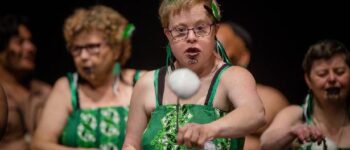1960: Disabled Persons Employment Promotion Act
June 7, 2021
By AHNZ

Two Ministers of Labour from the same political party had radically opposed views on how to help the disabled. From Labour 2.0, Fred Hackett. From Labour 5.0, Ruth Dyson. Hackett sponsored the Disabled Persons Employment Promotion Act (1960): An Act to make better provision for the employment of disabled persons.1 Dyson sponsored the repeal of the same in 2006.
What was this law? In short, it was an Act of Parliament to permit disabled New Zealanders to work rather than simply be put on welfare and paid to do nothing. Helen Clark’s Government repealed the law, effective 1 July 2007 after a transition period.
As all high school economics students learn, a Price Floor is a sort of Price Control that abolishes an entire market sector of people who are willing to buy and sell with each other up to a certain price. If you can create a job that pays less than that price then this Price Control makes that job illegal. Likewise, if your labour commands less than that price/wage then this law makes your work illegal to perform.
Apart from creating Deadweight Loss and Missing Markets, untold numbers of disabled and just plain elderly people are prevented from having a role in the workplace. Jobs that New Zealanders used to have either do not exist at all or else have been exported overseas for other nations without such Price Controls to perform at our expense.
“It allows organisations to form what are called sheltered workshops in which disabled persons can be employed… If the law were strictly enforced, some of the workshops now operating would be illegal, but naturally everybody has been closing their eyes to what has been going on. The time has now arrived, however, to grant legal exemption from the provisions of any award or industrial agreement..”The Minister’s approval of any organisation may be withdrawn if it is found—we hope and do not think it will be found—that disabled persons are being exploited. – Hackett, Hansard (1960)
“One of the tragedies in our community is the plight of that group of people who through infirmity, physical or mental, are unable to take their part in normal employment and who, because of their disabilities, are inclined to regard themselves as useless human beings with no further purpose in life.” – Gotz, ibid
“There is no doubt that the main desire of a person who is physically handicapped or intellectually handicapped is to take his place in the community in some way. It can be done, even although the field may be limited.” – King, ibid
“They will be able to go along and ask the manager for a job. He may argue, “I don’t know that you would be able to manage because of your disability,” and they will be in a position to say, “Give me an opportunity to prove myself.” They will be paid according to their worth.” – Sim, ibid
Labour 2.0, just prior to the 1960 election, which they lost, were not willing to relinquish their Price Controls. However, by Hackett’s Act they did provide a loophole for disabled people to not be disenfranchised. In a Statist economy it was an humanitarian act.
Repeal of the Disabled Persons Employment Promotion (DPEP,) 2007

Labour 5.0 (1999-2008,) ironically, had a policy called Pathways to Inclusion which was advertised as increasing participation of disabled people in employment and in their communities. One way of doing that, paradoxically, was by abolishing workplaces for the disabled as of 1 July, 2007.
In exchange, the disabled were given theoretical jobs wherein they earned the full minimum wage and full employment benefits. The only problem was that these employment opportunities were abstractions which replaced actual, tangible, paying, employment that Ruth Dyson’s Ministry had now abolished with the DPEP Act.
“The DPEP Act does not fit with the Government’s approach to disability issues (as set out in the New Zealand Disability Strategy), which aims at achieving a fully inclusive society where people with disabilities have the same opportunities as other New Zealanders to participate in training, and employment, and to receive fair remuneration. ” – Government Bill Explanatory Note, Disability Rights Education & Defense Fund, Wayback Machine
“The minister who forced the minimum wage on sheltered workshops in 2005. She was warned about the effect but bullocked on….I challenged the minister about the legislation and she adamantly stated there would be no revisiting the issue. Oddly the audience seemed unresponsive but I was approached by two or three afterwards who thanked and agreed with me. But the problem is so many so-called ‘charities’ receive govt-funding, so go along with the ‘programme’. The IHC did. I stopped collecting for them or donating.” – Lindsay Mitchell, Lindsay Mitchell (2021)
“They are absolutely dedicated to it… many of them are heartbroken. This is the centre of their lives. Some of the letters I have received… the loss to ‘Johnny’ and those families. He doesn’t understand why he can’t get up in the morning, get on the bus and go to work… he wants something to do all day…Some of these people have been with us for 20-30 years and trying to explain to them – there is no way to explain they haven’t done anything wrong. This isn’t their fault.” – Demise of a sheltered workplace that outlasted Labour 5.0’s repeal, only to be ended by Labour 6.0 in 2020, Ref. Disability employer Altus’ redundancy package: a story with no winners, RNZ (2020)
“Three years ago, an estimated 5000 people were working in vocational services, but that number had been reduced to under 1000, Southland Enterprises general manager Ian Beker said. “There is certainly a move to community participation rather than working. It appears the ministry does not like our model. They see us as a relic from Charles Dickens’ day.” Mr Beker said the repeal of the Act had cost the vocational service, which employs 103 people, more than $100,000 to implement, and it was Southland Enterprises, and not the ministry, which had to cover those costs.” – Resolute in face of adversity, ODT (2008)
Only one of the dozen Selmes Road Garden Centre workers has a job after the centre closes its gates for the last time today. “It’s not good. It’s hard on us. We wanted it to keep going,” said Richard Ashton. 50, who has worked at the nursery for 12 years. “At the end of the day, the majority of the disabled, especially the mentally disabled, have been disadvantaged by the repeal of the disability act.” – IHC garden workers out of a job, The Marlborough Express (2009)
“A Marlborough IHC founder Mick Murphy was outraged by a memo people affected by the new law received from Idea services manager Martin Anderson suggesting employees could become self employed…Mr Murphy said: “My intellectually disabled daughter, who cannot read or write brought home this (memo).” – ibid
 One of the essential ducks that Dyson got into her row was having the Society for Intellectually Handicapped Children (IHC) on its side. Offered $1,000,000 to sell the Selmes Road Garden Centre and its jobs, the owner, IHC, refused. Since being founded the IHC, like many organisations, has been captured and corrupted by the political Left.² Instead of work, welfare. This included music, marae visits, planning sessions, craft activities, and cycling. “Why not give them the opportunity to prove they are good workers? They will relish the challenge that work can give them, rather than the social-type activities that are being suggested.” said one mother.
One of the essential ducks that Dyson got into her row was having the Society for Intellectually Handicapped Children (IHC) on its side. Offered $1,000,000 to sell the Selmes Road Garden Centre and its jobs, the owner, IHC, refused. Since being founded the IHC, like many organisations, has been captured and corrupted by the political Left.² Instead of work, welfare. This included music, marae visits, planning sessions, craft activities, and cycling. “Why not give them the opportunity to prove they are good workers? They will relish the challenge that work can give them, rather than the social-type activities that are being suggested.” said one mother.
It’s no accident that Labour Minister Ruth Dyson had such a different outlook to Labour Minister Fred Hackett. The Labour Party had changed and it was Dyson who changed it. The exact moment can be pin-pointed to Dyson’s beating old Labour man Jim Anderton in the Labour Party election for Party President.
“The 90° tipping point came in on 3 September 1988 as Jim Anderton, representing the Old left, lost the presidential vote to Ruth Dyson of the New. Since then, Labours 4-6 have made an electoral plantation of the Victimhood Culture and left the old working class behind to expire unrepresented.” –1988: Labour Goes Full Victimhood, AHNZ
 Old Labour were pro-work and pro-worker. To them, work was dignity not indignity. The recognised, as do the disabled, the value of being engaged in productive activity rather than leisure. New Labour have a very different outlook and it has changed the country. They have replaced concrete solutions, work, with abstract solutions: the idea of work rights. Before Ruth Dyson, for example, the majority of supermarket trolleys were gathered and maintained by disabled people. Since 2007 that workforce has become a task for over-qualified young people with full pay and benefits while the people whose jobs these were are…I don’t know…stuck indoors watching TV or else being taken out for picnics or to Kapa haka Wokeshops.
Old Labour were pro-work and pro-worker. To them, work was dignity not indignity. The recognised, as do the disabled, the value of being engaged in productive activity rather than leisure. New Labour have a very different outlook and it has changed the country. They have replaced concrete solutions, work, with abstract solutions: the idea of work rights. Before Ruth Dyson, for example, the majority of supermarket trolleys were gathered and maintained by disabled people. Since 2007 that workforce has become a task for over-qualified young people with full pay and benefits while the people whose jobs these were are…I don’t know…stuck indoors watching TV or else being taken out for picnics or to Kapa haka Wokeshops.
I used to think this was economic ignorance on the part of people like Dyson and Labour 5.0 but now I’ve become cynical. Now I think they deliberately eliminated trades like these, jobs likes these, markets like these, on behalf of competitors. When little, competitive, firms are busted that business (and tax revenue) goes to someone else. Cui bono?
Former Labour MP Ruth Dyson,…has been awarded a Queen’s Service Order (QSO) for her services as an MP and also for disabled people.” – Queen’s Birthday honours list announced for 2021, RNZ (7 June, 2021)
What did Ruth Dyson do for disabled people anyway? All Wiki has to say is that she made NZ Sign Language ‘Official’. But that’s awful. The worst thing you can do for a culture is to take away the responsibility for its own perpetuation/mana/autonomy/funding and give it to government bureaucrats. Now, like Maori, it’s a language on welfare.
—
1 Ref. The Act, New Zealand Legal Information Institute
2 Any organization not explicitly right-wing sooner or later becomes left-wing (Conquest’s First Law of politics)
Ref. Dyson deserves diddly squat, Lindsay Mitchell (7 June 2021)
Ref. Parliamentary Hansard (1960); Hathi Trust Digital Library
Image ref. Hackett, Bay of Plenty Times, Tauranga City Libraries
Image ref. Dyson in her electorate office, predecessors McCombs and McCombs; David Alexander, Stuff
Image ref. The IHC helped take away work and replace it with cultural activities such as LARPing as a Maori; IHC, Facebook
Ref. also Anger at demise of homegrown Anzac poppies, Stuff (2010) and Disability employer Altus’ redundancy package: a story with no winners, RNZ (2020)
 Like Comment Share
Like Comment Share





